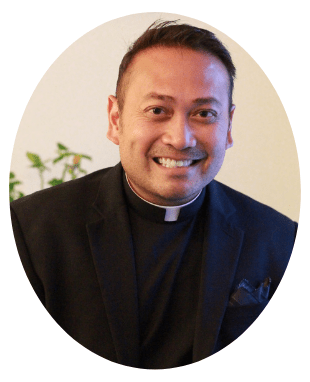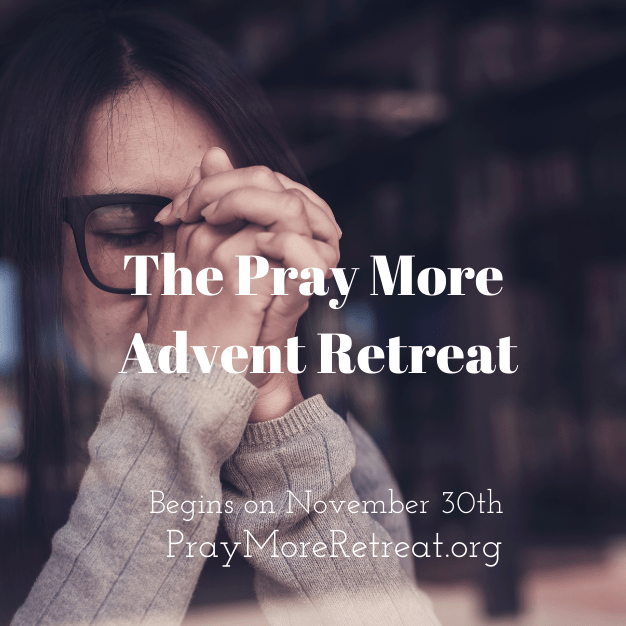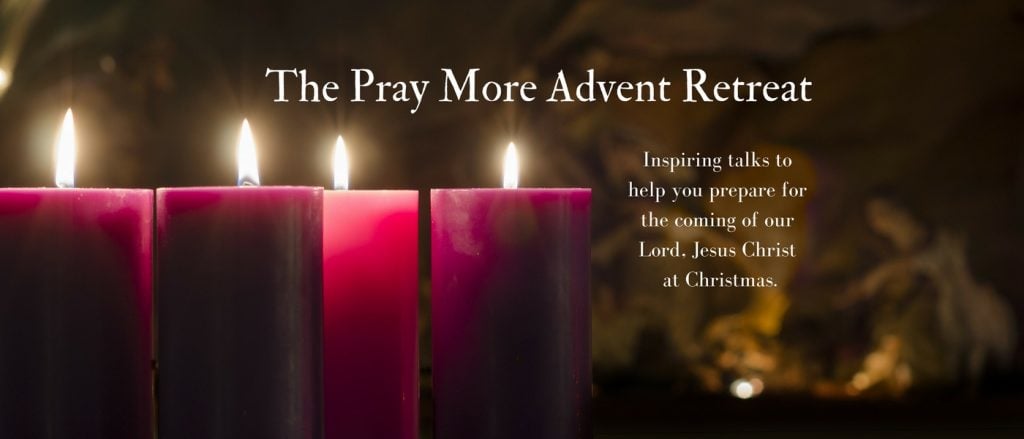Summary
Father Leo touches on the topic of the Sacrament of Reconciliation, and its importance. He encourages us to use this time to partake in the sacrament, if we can, for a more meaningful Advent season, and to be willing to be uncomfortable to seek the Lord’s kindness.
Thank you for watching and participating in this retreat!
Not Registered, yet? Don’t miss the rest of the talks! Register for the Pray More Retreat!
Downloads
Audio MP3
Click here to download audio file.
Printable Study Guide PDF
Click here to download the printable study guide.
Printable Transcript PDF
Click here to download the transcript of the video presentation.
Reflective Study Guide Questions
“ A voice cries out, prepare in the wilderness a road for the Lord! Clear the way in the desert for our God!” – Isaiah 40:3
- “Prepare the way of the Lord.” This is the declaration throughout the season of Advent. What are the things that you are doing to
prepare for His coming, and what sort of effect has it had on your heart so far? - Father Leo talks about finding the kindness of the Lord through confession, even though it may be uncomfortable at times. Have you
experienced the kindness of the Lord through confession? If you’ve not been able to go anytime recently, consider looking into an
Examination of Conscience and going through that list in your prayer this Advent. - Father Leo invites us to reflect and repent this season of Advent. In what ways can you incorporate this in your daily life during this
season? A nightly examen of your day? Apologizing and asking the Lord for forgiveness in prayer throughout your week?
Text: Purifying Our Faith
Brothers and sisters in Christ, we meditate, reflect, and learn from the readings given to us for the sacred liturgy in the second Sunday of Advent, and we begin with the opening prayer, our collect.
Opening Prayer
In the name of the Father and of the Son and of the Holy spirit. Amen. Almighty and merciful God may no earthly undertaking hinder those who set out in haste to meet your son but may our learning of heavenly wisdom gain us admittance to his company who lives and reigns with you in the unity of the Holy Spirit, one God forever and ever. Amen.
Jesus’ Precursor
Here’s a little tip for liturgy. There is something called the Entrance Antiphon. The antiphon is actually supposed to be the theme or the opening song, because all of the liturgical practices are pointing to a very specific theme in this season of Advent. And I’ll just read it to you because it is part of the scriptures. It comes from the book of the prophet Isaiah and it says this, “O people of Zion behold, the Lord will come to save the nations and the Lord will make the glory of his voice heard in the joy of your heart.” And so, this voice is something that I’d like to focus on during this second Sunday of Advent. And why? Because we’re going to be given a great image from the book of the prophet Isaiah.
And then of course, from the gospel according to Mark images of Jesus’s precursor the voice in the wilderness crying out in the desert, prepare the way of the Lord. We know him as John the Baptist, who’s culinary sensibilities, locust and wild honey does very little for me personally but actually it’s pretty interesting stuff. If you ever go to the Holy Land you will see how honey obviously come from bees, and the locust that they’re talking about is, is actually a form of a carob plant that it’s not necessarily locust itself, although we know some people actually turn that into something gourmet at times, but it looks like it’s a type of a carob plant, and from it, it actually tastes a little bit like chocolate. So, nothing necessary for you that’s going to change your mind and your heart, but you just have to know that John the Baptist lived a very natural lifestyle. He is Jesus’s cousin, obviously you know that from Luke’s gospel, but his job was to be a voice in the desert.
Comforted, not Comfortable
And this is a unique thing because, who’s in the desert? Who’s going to hear him? Well, you got to know something about the topography of Jerusalem and where all of this took place. It truly was the desert, but the Jordan river ran through it, and so there were pockets of places that had life and had vegetation. And it was there that John the Baptist really proclaimed the good news. And this is key because the desert is a place where you think life just doesn’t happen. But no, it’s a place where life is tested, and that’s what we might need to experience a little bit in our faith.
Because the fact is, we oftentimes come to church and we feel very entitled. If we’re not comfortable, we’re not happy. But the fact is you don’t go to church to be comfortable. You go to the church to be comforted. That’s why the first line from the first reading says this, “Comfort, give comfort to my people,” says the Lord, “Speak tenderly to Jerusalem and proclaim to her that her service is at an end. Her guilt is expiated. Indeed, she has received from the hand of the Lord double for all her sins.” And then it goes right into this line, “A voice cries out in the desert, ‘prepare the way of the Lord make straight in the wasteland a highway for our God, every valley shall be filled in, every mountain and hill shall be made low, the rugged land shall be made a plane, the rough country abroad valley. Then the glory of the Lord shall be revealed.'” So, this is John the Baptist, before John the Baptist. Because remember the prophet Isaiah was written way before John the Baptist was even a twinkle in Elizabeth and Zachariah’s eyes. That is Jesus’s aunt and uncle. But what we hear is comfort, and what we sometimes want is faith that is “comfortable.”
We would love to go to church and have, I don’t know, cushions on our pews seats and they would recline. But that’s not why we go to church. We go to church to participate in what is called a liturgy. And the word liturgy from the Greek leitourgia simply means work. And guess what? Work is supposed to give us comfort, because of what the word comfort means. It comes from the words com with forte, strength. And the only way that we’re going to have comfort in our faith is if we grow in strength. The only way that we’re going to grow in strength is if we work. What is the work we’re supposed to be doing?
You just heard it. Make the mountains highs low, fill the valleys. If there are rough ways, make them straight. In other words, let’s fix our lives. Fix it. And nobody wants to do it anymore. We love to sweep our problems under the rug and it takes a lot of strength, com forte to make the uncomfortableness in our lives more comfortable. And how do we do this? Well, we got to know one thing. It’s when we admit that we have turned little molehills into mountains, and when we we’ve turned, I don’t know a valley into just a moment of desolation.
Seek For the Kindness of the Lord
When we’ve dramatized our sins were not paid attention to it. And we sometimes think, well, I don’t think we need to talk about our sins because sins make us feel uncomfortable. I hope priests don’t talk about sins, various specific sins, because that’s going to implicate us that we are all sinful. And that’s exactly what this prophet of Isaiah is saying. Our guilt is expiated. We’ve received double for our sins. And therefore, what we’ve got to do is seek the Lord where he may be found. And when we find him, guess what we’re going to discover? His kindness, and he will grant us salvation. That’s Psalm 85. “Lord let us see your kindness and grant us your salvation.”
And so, I ask you this, where do you find the kindness of the Lord? Is it when we start giving out food baskets during the season? No. We find the kindness of the Lord in a very uncomfortable place that actually gives us strength. It’s called the confessional. When we are actually willing to just grow up and admit that we’ve done wrongs and approach the sacrament of healing, the sacrament of confession, then we will experience the kindness of the Lord and we will be stronger in our faith. And I know that this is a painful thing, but you got to admit something. We can’t ignore this fact that with the Lord, one day is like a thousand years and a thousand years is like a day. The Lord does not delay in His promise, but He is patient with you. Not wishing that you should perish but that you should all come to repentance.
The Importance of Confession
This is the second reading from the letter of St. Peter. You can see how these readings flow into being able to hopefully integrate what we’re hearing and actually do something about it. And what are we supposed to do about it? Go to confession, because we’re not perfect. And you heard it very clearly from Saint Peter, that he doesn’t want us delay. Come to us now you will see the kindness of God in the sacrament of reconciliation, but God is patient with us because He doesn’t want us to perish but that we should all come to a sense of repentance. That’s the very uncomfortable message that John the Baptist came and preached about that we hear in the gospel according to Mark. It says here, once again referring to the prophet Isaiah, “Behold I am sending a messenger ahead of you. He will prepare your way, a voice of one crying out the desert, prepare the way of the Lord, make it straight, proclaiming a baptism of repentance for the forgiveness of our sins.”
I want to just kind of keep it easy for you all. What are these readings trying to tell us? One, that we’re not perfect. Two, that we have a very crooked path to God. How do we make it straight for ourselves when we allow God to give us His forgiveness but He can only forgive us, he can only forgive us if we are willing to repent. And that’s one of the reasons why the Catholic Church actually has the sacrament of reconciliation.
A Pastoral Note
And just on a pastoral note, I like to tell people because they will ask, “How often should I go to confession?” Well, you go, whenever you feel like you need to go. That’s easy. But you also ought to consider that when we go to confession, we’re experiencing the comfort of God. And so go regularly. At the very least we’re supposed to go to make our Easter duty. That’s why a lot of people go to confession during the Lenten Season. And perhaps that’s one reason why I just think that when the church decorates itself in purple, it’s a penitential season. I always recommend to people just go to confession at least twice a year before the big holidays. Some will even go as devotion once a month.
If you, however, are becoming a little bit more scrupulous and uncomfortable and trying to go to confession like every two days or three days or weekly and kind of making your sins bigger than God’s mercy, then what you need to do is trust that God has forgiven you, and that may be what he’s asking you to do is live with your, not sins, but live with your imperfections. But don’t be comfortable with your imperfections. Realize that we’re just going to have to live our life trying to manage as best as we can, because guess what? On our way to heaven, there will be mountains that we did not create, there will be rough patches that we did not ask for. But fear not, God loves you. He is not only with you, He is calling you and giving us even the sacraments visible signs of invisible grace to let us know that whatever journey or path you are on, He is there walking with you every step of the way.
Hear the Voice of the Prophet
Our job is to listen to the modern-day prophets. And if the prophets are telling you, “You don’t have to worry about your sins,” then that is a false prophet. But if you can truly hear the voice of the prophet who we hear about twice in the first reading and in the gospel, then we are going to repent. We are going to go in haste to meet Christ, the divine physician. And we will, yes, experience a desert for sure. And not comfortable place to be in. No, indeed I do not want to be in the desert to practice my faith, but I can tell you what, it is in the desert that our faith is purified and that we fight to live. And that’s one reason why the voice comes from the desert.
So, I invite you brothers and sisters to enter into your souls a little bit and see how perhaps in the silence and the depth of hearts, the prophet John the Baptist is encouraging us all to repent and experience the kindness and the strength and the comfort of Jesus Christ.
Glory Be
Glory be to the Father and to the Son and to the Holy Spirit as it was in the beginning is now and will be forever. Amen. In the name of the Father and of the Son and of the Holy Spirit. Amen. Go in peace. Thanks be to God.
About Speaker Fr. Leo Patalinghug

Father Leo is a priest member of a community of consecrated life, Voluntas Dei (The Will of God). He is the creator and founder of an international food and faith movement called Plating Grace, whose mission is to build relationships, strengthen families, as well as communities, utilizing the power of food. The movement began with one proven concept; the act of sharing meals can help families thrive and bring people together who may have different views or backgrounds. Plating Grace has now reached thousands of people through Father Leo’s pilgrimage around the world to feed people body, mind and soul.
Father Leo is also the founder and chair of the nonprofit group, The Table Foundation, a nonprofit organization with a mission to support to culinary community along with assisting those returning to the community from the prison system. The objective being to assimilate them through a formation process and give them culinary training to obtain skills needed to earn gainful employment.. His unique background as a chef and his previous experience as a two-time black belt martial arts instructor and former award-winning break dancer and choreographer has earned the attention of major media outlets, including the Food Network where he won, “Throwdown with Bobby Flay!” The mission to see food as a gift from God to nourish your family and to strengthen relationships is making this world a better place one meal at a time.

